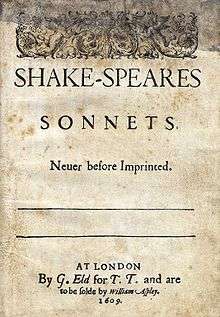Sonnet 114
Sonnet 114 is one of 154 sonnets written by the English playwright and poet William Shakespeare. It is a member of the Fair Youth sequence, in which the poet expresses his love towards a young man.
| Sonnet 114 | |||||||
|---|---|---|---|---|---|---|---|
 Sonnet 114 in the 1609 Quarto | |||||||
| |||||||
Synopsis
Is the poet's mind flattered, like a king, by the youth's presence, or is it simply a truth that is being told by his eyes that ugly things are made beautiful by the mental image of the youth? Surely it must be flattery, that he consumes like a king. He knows he enjoys it even if it's poisonous. Even if it is, it's less of a sin because his eye is motivated by love.
Structure
Sonnet 114 is an English or Shakespearean sonnet. The English sonnet has three quatrains, followed by a final rhyming couplet. It follows the typical rhyme scheme of the form ABAB CDCD EFEF GG and is composed in iambic pentameter, a type of poetic metre based on five pairs of metrically weak/strong syllabic positions. The 7th line exemplifies a regular iambic pentameter:
×/ × / × / × / × / Creating every bad a perfect best, (114.7)
Lines 6, 8, 9, and 11 have a final extrametrical syllable or feminine ending:
× / × / × × / / × / (×) Such cherubins as your sweet self resemble, (114.6)
- / = ictus, a metrically strong syllabic position. × = nonictus. (×) = extrametrical syllable.
Line 6 exhibits another metrical variation, the rightward movement of the third ictus (resulting in a four-position figure, × × / /, sometimes referred to as a minor ionic). Minor ionics may potentially be found in lines 5 and 10. Another metrical variation, a mid-line reversal, is found in line 4:
× / × / / × × / × / And that your love taught it this alchemy, (114.4)
An initial reversal is potentially present in line 2.
The meter demands a few variant pronunciations: Line 1's "being" functions as one syllable, and line 9's "flattery" as two.[2]
Notes
- Pooler, C[harles] Knox, ed. (1918). The Works of Shakespeare: Sonnets. The Arden Shakespeare [1st series]. London: Methuen & Company. OCLC 4770201.
- Booth 2000, p. 375, 99.
References
- First edition and facsimile
- Shakespeare, William (1609). Shake-speares Sonnets: Never Before Imprinted. London: Thomas Thorpe.CS1 maint: ref=harv (link)
- Lee, Sidney, ed. (1905). Shakespeares Sonnets: Being a reproduction in facsimile of the first edition. Oxford: Clarendon Press. OCLC 458829162.
- Variorum editions
- Alden, Raymond Macdonald, ed. (1916). The Sonnets of Shakespeare. Boston: Houghton Mifflin Company. OCLC 234756.
- Rollins, Hyder Edward, ed. (1944). A New Variorum Edition of Shakespeare: The Sonnets [2 Volumes]. Philadelphia: J. B. Lippincott & Co. OCLC 6028485.
- Modern critical editions
- Atkins, Carl D., ed. (2007). Shakespeare's Sonnets: With Three Hundred Years of Commentary. Madison: Fairleigh Dickinson University Press. ISBN 978-0-8386-4163-7. OCLC 86090499.
- Booth, Stephen, ed. (2000) [1st ed. 1977]. Shakespeare's Sonnets (Rev. ed.). New Haven: Yale Nota Bene. ISBN 0-300-01959-9. OCLC 2968040.
- Burrow, Colin, ed. (2002). The Complete Sonnets and Poems. The Oxford Shakespeare. Oxford: Oxford University Press. ISBN 978-0192819338. OCLC 48532938.
- Duncan-Jones, Katherine, ed. (2010) [1st ed. 1997]. Shakespeare's Sonnets. The Arden Shakespeare, Third Series (Rev. ed.). London: Bloomsbury. ISBN 978-1-4080-1797-5. OCLC 755065951.
- Evans, G. Blakemore, ed. (1996). The Sonnets. The New Cambridge Shakespeare. Cambridge: Cambridge University Press. ISBN 978-0521294034. OCLC 32272082.
- Kerrigan, John, ed. (1995) [1st ed. 1986]. The Sonnets ; and, A Lover's Complaint. New Penguin Shakespeare (Rev. ed.). Penguin Books. ISBN 0-14-070732-8. OCLC 15018446.
- Mowat, Barbara A.; Werstine, Paul, eds. (2006). Shakespeare's Sonnets & Poems. Folger Shakespeare Library. New York: Washington Square Press. ISBN 978-0743273282. OCLC 64594469.
- Orgel, Stephen, ed. (2001). The Sonnets. The Pelican Shakespeare (Rev. ed.). New York: Penguin Books. ISBN 978-0140714531. OCLC 46683809.
- Vendler, Helen, ed. (1997). The Art of Shakespeare's Sonnets. Cambridge, MA: The Belknap Press of Harvard University Press. ISBN 0-674-63712-7. OCLC 36806589.
.png)
